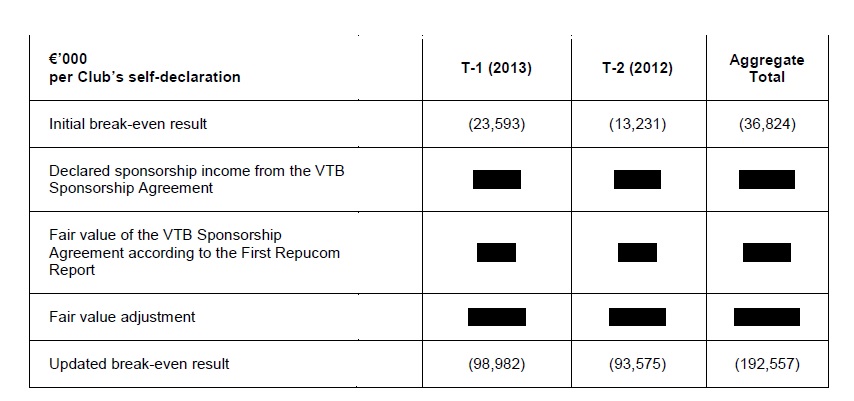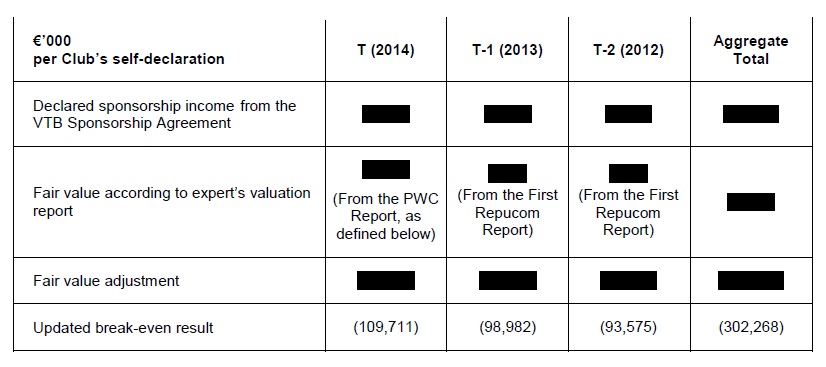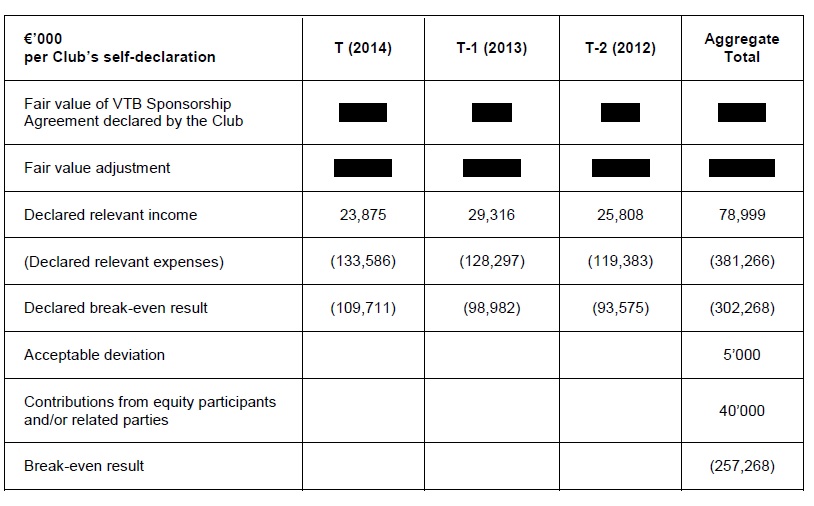Ever since UEFA started imposing disciplinary
measures to football clubs for not complying with Financial Fair Play’s break-even requirement in 2014, it remained a mystery how UEFA’s
disciplinary bodies were enforcing the Club Licensing and Financial Fair Play (“FFP”)
regulations, what measures it was imposing, and what the justifications were for
the imposition of these measures. For over a year, the general public could
only take note of the 23 settlement agreements between Europe’s footballing
body and the clubs. The evidential obstacle for a proper analysis was that the
actual settlements remained confidential, as was stressed in several of our
previous Blogs.[1]
The information provided by the press releases lacked the necessary information
to answer the abovementioned questions.
On 24 April 2015, the UEFA Club Financial
Control Body lifted part of the veil by referring FC
Dynamo Moscow to the Adjudicatory Body. Finally, the Adjudicatory Body had the
opportunity to decide on a “FFP case. The anxiously-awaited Decision was reached by
the Adjudicatory Chamber on 19 June and published not long after. Now that the
Decision has been made public, a new stage of the debate regarding UEFA’s FFP
policy can start.
This blog will firstly outline the facts of
the FC Dynamo case and describe how
and to what extent FC Dynamo breached the FFP rules. Secondly, the argumentation
and the disciplinary measures imposed by the Adjudicatory Chamber will be
scrutinized and compared to the measures imposed on other football clubs who,
unlike FC Dynamo, were capable of reaching a settlement with UEFA.
The build-up to the Decision
After the CFCB Investigatory Chamber met to
assess FC Dynamo’s monitoring documentation in August 2014, it quickly became
apparent that FC Dynamo had a break-even deficit. The deficit amounted to
€13,231,000 for 2012 and €23,593,000 for 2013, giving an aggregate total of
€36,824,000.[2] What
was more important for the assessment, however, was the close relationship the
Russian football club had (and still has) with JSC VTB Bank (“VTB”). VTB is
both the main shareholder in FC Dynamo (holding 74% of the shares in the club)
and the club’s principal sponsor.[3]
In accordance with Article 58(1) of the FFP regulations, the relevant income under
the regulations includes the revenue derived from sponsorship and advertising.
Furthermore, as is stipulated in paragraph 4 of that same Article, relevant
income from related parties (such as sponsors) must be adjusted to reflect the
fair value of any such transactions. Thus, the CFCB Chief Investigator requested
a copy of the sponsorship agreement between FC Dynamo and VTB in order to assess
whether it was in conformity with the “fair value” requirement.[4]
The documentation that FC Dynamo provided was based on a separate valuation
report by the firm ‘Repucom’.
The results of the calculations made by the
Investigatory Chamber are staggering. Where the break-even deficit without
taking into account the sponsorship agreement amounted to €36,824,000 for 2012
and 2013, the final number, after “fair value” adjustment of the sponsorship
agreement, amounts to a whopping €192,557,000. These results are shown in the
following table, which is taken from the Decision.

Table 1[5]
Given that the investigations of the
Investigatory Chamber were taking place towards the end of the monitoring
period 2014, the Chamber asked the Russian football federation to send updated
monitoring information covering the year 2014.[6]
In order to calculate the updated break-even result, it included a second
valuation report done by PWC, in addition to the Repucom report. The final break-even
result for the monitoring years 2012-2014 is €302,268,000, as can be seen in
the second table below.

Table 2[7]
In
accordance with Article 61 (2) of the FFP Regulations, the acceptable deviation
from the break-even requirement is €45,000,000 for the monitoring period
assessed in the seasons 2013/14 and 2014/15. Therefore, in order to determine
the aggregate total of FC Dynamo’s break-even deficit is €302,268,000 -
€45,000,000 = €257,268,000 (see table 3).
 Table 3[8]
Table 3[8]
An
aggregate break-even deficit of €257,268,000 is incredibly high. Especially if
one takes into account that the break-even deficit for the years 2012 and 2013
without the sponsorship agreement amounted to “only” €36,824,000. Even though
both the fair value of the VTB sponsorship agreement declared by FC Dynamo and
the fair value adjustment according to the Investigatory Chamber have been censored[9]
in the Decision, one can safely assume that the adjusted value of the
sponsorship agreement was roughly €200,000,000 less than what FC Dynamo was
receiving from VTB over a period of three years.
In
March 2015, the Chief Investigator informed FC Dynamo that UEFA would withold
the revenue obtained by the club in European competition.[10]
Not long after this decision, on 27 March a meeting was held between the
Investigatory Chamber and FC Dynamo. Though the details of the meeting remain
unknown, evidently no settlement between the club and the Investigatory Chamber
was reached, thereby making FC Dynamo the
first club failing to do so. As a consequence of the parties’ failure of
reaching a settlement agreement, the Chief Investigator referred the case to
the Adjudicatory Chamber. Moreover, in addition to the referal of the case in
accordance with Article 14(1) of the Procedural
Rules governing the UEFA Financial Control Body to the Adjudicatory
Chamber, the Chief Investigator suggested that FC Dynamo were to be excluded
from at least one UEFA club competition for which FC Dynamo would qualify in
the future, and advocated a fine of at least €1,000,000.[11]
Pursuant
to Articles 20(1) and 23(1) of the Procedural rules, the Adjudicatory Chamber
asked FC Dynamo to submit its observations and convened an oral hearing with
the club on 16 June 2015.[12]
Having received all the information it required, the Adjudicatory Chamber
proceeded to formulate its final Decision in accordance with Article 27 of the
Procedural Rules.[13]
The Adjudicatory Chamber’s
Decision
The Adjudicatory Chamber agreed with the
Investigatory Chamber that the key issue in the FC Dynamo case is the valuation of the sponsorship agreement with
VTB. The Chamber accepted that this value had to be adjusted to a fair value
and that the Expert Reports (Repucom and PWC) were an appropriate basis to do
so.[14]
Mostly, the Chamber based its final decision on the Investigatory Chamber’s
findings. In the end, it concluded that, “no matter which Expert Report
valuations are used, the Club has failed to fulfil the break-even requirement
because it had an aggregate break-even deficit within the range set out in Paragraph
58” of the FFP Regulations.[15]
FC Dynamo was granted the opportunity to
explain and justify why it had failed to meet the break-even requirement. The
club’s arguments can be summarized as follows:
1. The Russian
television market generates less revenues than the television market in other
European States, thereby creating an economic disadvantage for the Russian
clubs.[16]
2. The
Russian league imposes restrictions on foreign players.[17]
3. The
Russian clubs have suffered economically from the fluctuating exchange rates.[18]
The Adjudicatory Chamber counter argued as
follows:
1. Other European States
also generate less revenue from television. However, their clubs comply with
FFP rules.[19]
2. A vast majority of
European leagues are subject to limitations regarding the use of foreign
players. Russia is not “special” in that regard.[20]
3. Changes in exchange
rates may have had an adverse impact on FC Dynamo’s liability under a loan
denominated in Euros. However, this did not result in an adverse impact on the
Club’s break-even result. Furthermore, it must be remembered that the impact of
such fluctuations can be reasonably considered negligible in the context of FC
Dynamo’s overwhelming failure to comply with the break-even Requirement.[21]
FC Dynamo’s financial
projections and the Compliance Plan
In the observations submitted by FC Dynamo to
the Adjudicatory Chamber, the club also presented plans that will allow it to
fulfil the break-even requirement in the future. First of all, FC Dynamo’s
plans for a new stadium will allow it to generate more revenue.[22]
Secondly, the club indicated that it was seeking new investment in the club by
means of selling shares and that it will enjoy increased revenues from new
sponsorship and retail opportunities. [23]
In addition to the financial projections, FC Dynamo also held that it had
introduced new internal guidelines to govern its transfer activities (including
a salary cap) and has suggested that an emphasis will be placed on more youth
players being promoted to the first team.[24]
Again the Chamber was not convinced. FC Dynamo’s
proposals were deemed “vague in substance and its projections appear overly
optimistic. Whilst the Club’s good faith throughout the proceedings and
acknowledgement that it must adjust its business model is welcomed, its
proposed route to compliance with the Break-even Requirement is far from
certain.”[25] As
regards the stadium, since it will not be owned by FC Dynamo itself[26],
the Chamber argued that it remains unclear whether it will generate more
revenue. And even if it does, this will not happen before 2018. It also remains
uncertain whether FC Dynamo will attract new investment. The Chamber is aware
of VTB’s plans to sell its shares, but is uncertain if any sale can be effected
in the near future. The potential buyer of these shares, Dynamo Sports Society,
and VTB have only signed a non-committal intention clause regarding the
transfer.[27]
Further, the Chamber deems it unlikely that FC Dynamo will comply with the
break-even requirement through increased sponsorship revenue. As FC Dynamo
itself pointed out in its observations, “unfavourable economic conditions” may
make it difficult to attract new investment.[28]
More importantly, “having regard to the scale of the Club’s failure to fulfil
the Break-even Requirement, even a strong increase in revenues from commercial
activities and player sales would be unlikely to bring about FC Dynamo’s
sustained and consistent compliance with the Break-even Requirement, for so
long as the related party issues surrounding VTB’s involvement with the Club
persist”.[29]
Lastly, the Chamber welcomes the club’s ambition to reform its transfer
activities and place more emphasis on youth players, but similarly held that
there is no guarantee that FC Dynamo will actually comply with such policies.[30]
Disciplinary Measures
According to the Chamber, FC Dynamo failed to justify
the break-even deficit convincingly and, consequently, faced disciplinary
measures. By form of reminder, the Chamber stressed that the objectives of the
FFP Regulations included the encouragement of clubs to operate on the basis of
their own revenues and, thus, the protection of the long-term viability and sustainability
of European football. Furthermore, the principle that all clubs competing in
UEFA’s club competitions must be treated equally underpins the Regulations. Since
not meeting the break-even requirement may directly affect the competitive
position of a club, to the detriment of clubs who comply with the FFP
Regulations, this principle has even greater force.[31]
The main, and extreme, disciplinary measure
imposed by the Chamber upon FC Dynamo, consists of an exclusion from the next
UEFA club competition for which the club would otherwise qualify in the next
four seasons (i.e. the 2015/16, 2016/17, 2017/18 and 2018/19 seasons). Given the scale of the club’s failure to
comply with the break-even requirement, the measure is regarded by the Chamber
as the “only appropriate measure to deal with the circumstances of this case”.[32]
As for FC Dynamo, under Article 34(2) of the Procedural Rules, it had 10 days
to appeal the Decision in writing in front of the CAS.
Concluding remarks
First and foremost, the exclusion from
European competitions as a disciplinary measure has, so far, only been imposed on
FC Dynamo. None of the club with whom the Investigatory Chamber had reached
settlement agreements have been excluded from European competitions for
breaching the break-even requirement.[33]
The Adjudicatory Chamber had stated numerous times in its Decision that the key
factor in the FC Dynamo’s case was
the scale of the club’s failure to comply with the break-even requirement. From
an objective point of view, a break-even deficit of €257,268,000 is very high
indeed. In the view of the Chamber, it justified such a far going disciplinary
measure. The question remains, however, what the break-even deficit was for
those clubs who managed to reach settlement agreements. Was the break-even
deficit for clubs like Manchester City and PSG lower or higher than 257
million? If it was equal or higher than this amount, how did these clubs manage
to settle where FC Dynamo failed? Would the measures imposed on FC Dynamo be
considered proportionate if other clubs had the same or higher break-even
deficit?
On a different note, the FC Dynamo case does allow us to understand better the rationale
behind the Adjudicatory Chamber’s decision to impose certain disciplinary
measures. It is interesting to see how much weight it places on sponsorship
agreements that, according to the Chamber, do not represent a fair market
value. This is not only useful information for football clubs, but also to
third parties who might be interested in sponsoring a football club. On a
downside, we will probably never know exactly what the value of the sponsorship
agreement was according to the club, and how it was adjusted by the two
Chambers. Even though FC Dynamo had the right to keep certain information
confidential, knowing the two figures would have helped us to better understand
the reasoning used by the Chambers in reaching their decisions and choosing to
exclude FC Dynamo from UEFA competitions.
Finally, these are still crucial times as
regards the functioning and the legality of UEFA’s FFP rules. The rules are
being challenged in front of both the French and Belgium courts as we speak and
there is always the possibility (though remote, see our blog) of the
European Courts having to judge on the matter. A challenge in front of the CAS could
be seen as a welcome contribution to test the legality, the functioning and the
proportionality of the rules. Though it is currently unknown whether FC Dynamo
has made use of the opportunity to appeal the case to the CAS.
[1] See e.g.: Luis Torres, “Financial Fair Play:
Lessons from the 2014 and 2015 settlement practice of UEFA” (8 June 2015); and Oskar van
Maren, “The Nine FFP Settlement Agreements: UEFA did not go the full nine yards” (19 May 2014).
[2] Decision in Case AC-02/2015
CJSC Football Club Dynamo Moscow of 19 June 2015, para. 5.
[3] Ibid, para. 56.
[4] Ibid, paras. 7-10.
[5] Ibid, para. 11.
[6] Ibid, para. 8.
[7] Ibid, para. 15.
[8] Ibid, para.
24.
[9] Under Article 33(3) of the
Procedural Rules Governing the UEFA Financial Control Body, “the adjudicatory
chamber may, following a reasoned request from the defendant made within two
days from the date of communication of the decision, redact the decision to
protect confidential information or personal data”.
[10] Decision in Case AC-02/2015,
para. 17.
[11] Ibid, para.
25.
[12] Ibid, paras.
28-31.
[13] Under Article 27 of the
Procedural Rules, the adjudicatory chamber may take the following final
decisions:
a)
to dismiss the case; or
b)
to accept or reject the club’s admission to the UEFA club competition in
question; or
c)
to impose disciplinary measures in accordance with the present rules; or
d)
to uphold, reject, or modify a decision of the CFCB chief investigator.
[14] Decision in Case AC-02/2015,
para. 56.
[15] Ibid, para. 60.
[16] Ibid, para. 67.
[17] Ibid, para. 70.
[18] Ibid, para. 72.
[19] Ibid, paras. 68 and 69.
[20] Ibid, para. 71.
[21] Ibid, paras. 73-75.
[22] Ibid, para. 84.
[23] Ibid, paras. 89 and 94
[24] Ibid, para. 97.
[25] Ibid, para. 83.
[26] According to para. 85, the
stadium will be owned and operated by a separate legal entity named ‘Assets
Management Company Dynamo’.
[27] Ibid, paras. 89-90
[28] Ibid, para. 91.
[29] Ibid, para. 96.
[30] Ibid, para. 97.
[31] Ibid, paras. 77-80
[32] Ibid, paras. 101-102
[33] For more information on the
settlements agreements, see our blog from 9 June 2015.